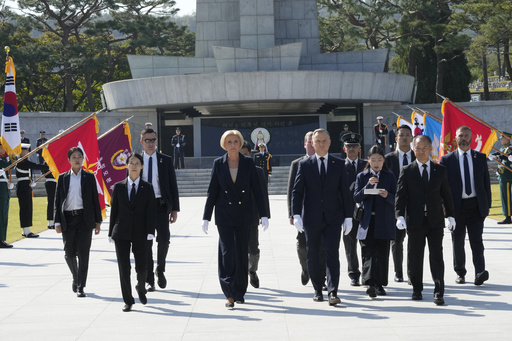
SEOUL, South Korea — The President of South Korea emphasized on Thursday that his administration will not remain passive in light of North Korea’s purported move to dispatch troops to aid Russia in its ongoing conflict with Ukraine. This statement was made during a meeting with the Polish President, as the two leaders conversed about enhancing their defense collaboration amidst the tumultuous situation in Ukraine.
The discussions between South Korean President Yoon Suk Yeol and Polish President Andrzej Duda occurred shortly after American and South Korean officials expressed concerns that around 3,000 North Korean troops have been deployed to Russia for training at various sites. Reports from South Korea’s intelligence agency indicated to lawmakers that North Korea aims to increase this number to approximately 10,000 troops by year-end.
Both North Korea and Russia have rejected the claims regarding the deployment of North Korean forces. Following their summit, Yoon stated, “We reached a consensus that the dispatch of North Korean troops to Russia, which constitutes a violation of the U.N. Charter and U.N. Security Council resolutions, poses a significant risk to global security.” He mentioned that South Korea plans to collaborate with its allies to implement countermeasures, which may be executed progressively based on the level of military cooperation emerging between Pyongyang and Moscow.
Earlier in the week, Yoon’s office noted that South Korea is exploring a variety of diplomatic, economic, and military strategies, which could include furnishing Ukraine with both defensive and offensive weaponry. As an emerging arms exporter, South Korea has previously provided humanitarian assistance and other non-lethal supplies to Ukraine while supporting U.S.-led sanctions against Russia. However, Seoul has refrained from sending arms directly to Ukraine, in line with its longstanding policy against supplying weapons to nations engaged in active military conflicts.
Since 2022, tensions on the Korean Peninsula have escalated, largely due to North Korean leader Kim Jong Un’s exploitation of Russia’s invasion to divert attention while enhancing his nuclear weapons and missile capabilities. There are growing concerns in Seoul, as experts warn that North Korea might seek substantial technological exchanges in return for its troop deployments, which could include acquiring advanced Russian technologies related to intercontinental ballistic missiles and submarines—significantly elevating the threat posed by Kim’s nuclear arsenals.
During their discussions, the two leaders also reached an agreement to “actively support” further shipments of military equipment from South Korea to Poland. This includes plans for a new agreement regarding the K-2 tanks, which the countries are aiming to finalize within the current year, according to Yoon’s office. Poland has entered into multiple arms contracts with South Korea over the last two years, acquiring tanks, howitzers, and missile systems to bolster its military capabilities in response to the heightened threat following Russia’s invasion of Ukraine.
